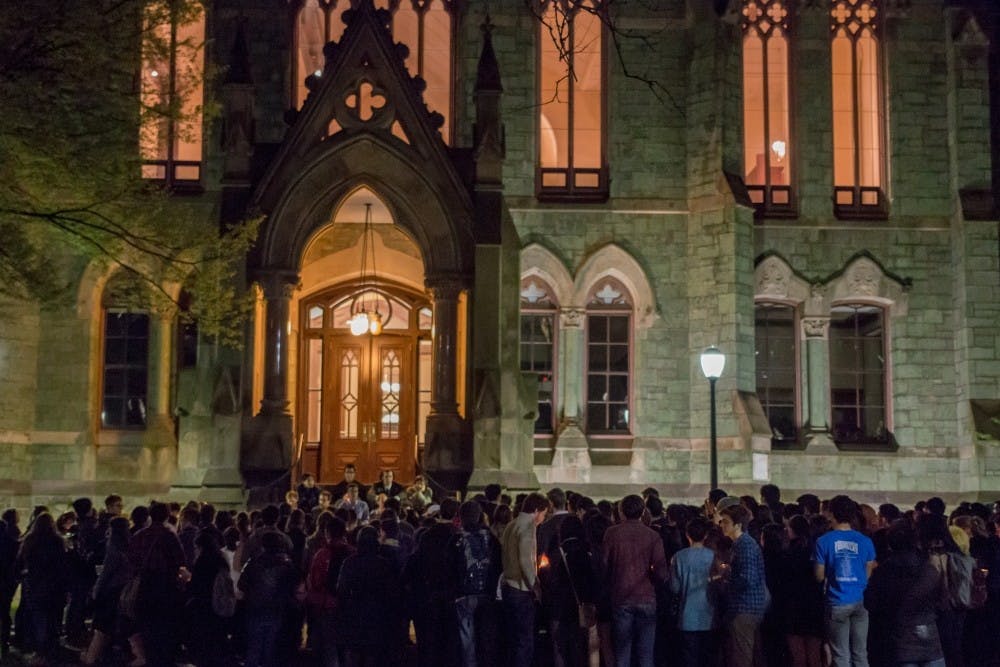A lawsuit filed against the University related to the death of former student Olivia Kong saw its first major development this summer, when the plaintiff and defense legal teams agreed upon several projected dates for the case.
Former Wharton junior Olivia Kong died by suicide in April 2016, and her parents took legal action against Penn this April, when they filed a suit alleging that Kong and those close to her informed the University on nine separate occasions that Kong was having suicidal thoughts. The lawsuit claims the school did not take the suitable steps to prevent her death.
At the case management conference on July 16, the judge met with both parties in the case and set the projected settlement conference date for Feb. 3, 2020, the projected pre-trial conference date to April 6, 2020, and the projected trial date to May 4, 2020, according to public court documents.
Kong's parents, Xianguo Kong and Zhao Lin, are being represented by Carol Nelson Shepherd of Feldman Shepherd law firm in Philadelphia.
At a case management conference, which typically occurs within several months after a lawsuit filing, the judge meets with both legal parties to make the first attempts to settle the case and, if that is not successful, proceeds to select dates for further court proceedings.

There is typically a long wait between the filing of the lawsuit and the actual trial dates, providing ample time for the parties either to settle the case or to prepare for the trial, Shepherd said.
"For a case in Philadelphia County, it normally takes two years from the time you file the complaint until the case is resolved, one way or another," Shepherd added.
Despite the projected trial date, legal experts indicate that most cases end up being settled, avoiding the trial altogether. Executive Director of the National Behavioral Intervention Team Association Brian Van Brunt, who previously served as the director of counseling at several universities, said lawsuits against universities in cases similar to the Kong lawsuit typically end in settlements.
At the time the lawsuit was filed, Penn spokesperson Stephen MacCarthy said in an emailed statement the University does not comment on pending litigation.
Before this case, there had been two previous lawsuits filed by parents against Penn alleging that the University acted negligently leading up to a student's suicide.
In 2015, Penn was sued by Sujata Singh, the mother of former Nursing student Arya Singh, who died by suicide in 2013. Her complaint, which listed Amazon as a defendant, referred to alleged "unsympathetic, hostile and at times vindictive" actions on the part of members of the Penn administration toward Singh. The case was settled two years later.
Former College junior and track star Timothy Hamlett died by suicide during the 2015-16 academic year, prompting his mother to file a lawsuit against the University and against her son's former track and field coach in May 2017. The lawsuit alleged “gross negligence and a breach of the duty owed given the special relationship between a student-athlete and his coach.” The lawsuit was dismissed in December 2017.
Fourteen Penn students are confirmed to have died by suicide since 2013.
At a press conference in April, Shepherd said Kong had visited Student Health Services, had two extensive conversations with the counselor on the emergency phone line at Counseling and Psychological Services, and spoke with several other officials, about her considering suicide.
Kong's death prompted criticism among members of the Penn community about the way the University reported her death — first in an email from the President's office, which did not include Kong's name, but which was sent to all undergraduate students; second in an email to Wharton students, which included her name but described the death as an "accident."
Backlash from the student body prompted the administration to work more directly with students involved in the postvention process of a student's death.
While Shepherd stressed settlements are likely to occur in similar cases to Kong's, she did not comment on the likelihood for this case to result in a settlement.
"Most complex cases don't settle until all cards are on the table," Shepherd said. "Then, the parties — both the plaintiff and the defendant — know that if they don't make some effort to resolve the case voluntarily, then they are going to have a trial."



